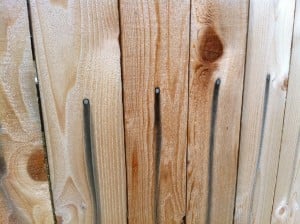As I am driving around the neighborhood, there are several things that catch my eye on fences that drive me nuts. It could be the fasteners, the materials that were used, the slant of the fence… after almost a decade in this industry, I have learned there are several things that you want to avoid when contracting out your fence.
Wrong type of fence fasteners

Here in the Pacific Northwest, if you use the wrong fastener- i.e., a galvanized fastener, it will leave streaks on your fence. When the water hits the fastener, it reacts with the wood and can rust or bleed. It looks similar to mascara running down the fence. What would be a better option here is a stainless steel or aluminum fastener that has a special coating that will prevent it from bleeding or rusting.
Slanting fence
It is common to see a fence that looks great, but the top was done poorly. It might not be stair stepping correctly, the slope might be off, or the fence might be uneven all the way across… either way, the final look isn’t great. After seeing hundreds of projects being built, I understand it takes a trained eye to be able to assess how to get a fence even.
Wonky posts
If you see a fence that is perfectly straight, it looks great! If your fence post is off, it creates a bend in the fence that is noticeable even to an untrained eye. This is easily preventable and one of the biggest consequences of a quickly done job.
Wrong fence material used
With the types of material available, even in big box stores, it is a bummer to see that the wrong materials are used to build fences! One of the best materials for a wood fence is high end cedar. The cheapest grade at the box store will reinforce the idea: you get what you pay for. Tip: the quality of materials at a box store will typically be lower than at a specialty fence supply store. A higher grade of cedar will have fewer knots than a low grade of cedar, which will have lots of knots and splits. Two years after install, the knots will have opened up and the boards will be more prone to splitting and cracking.

